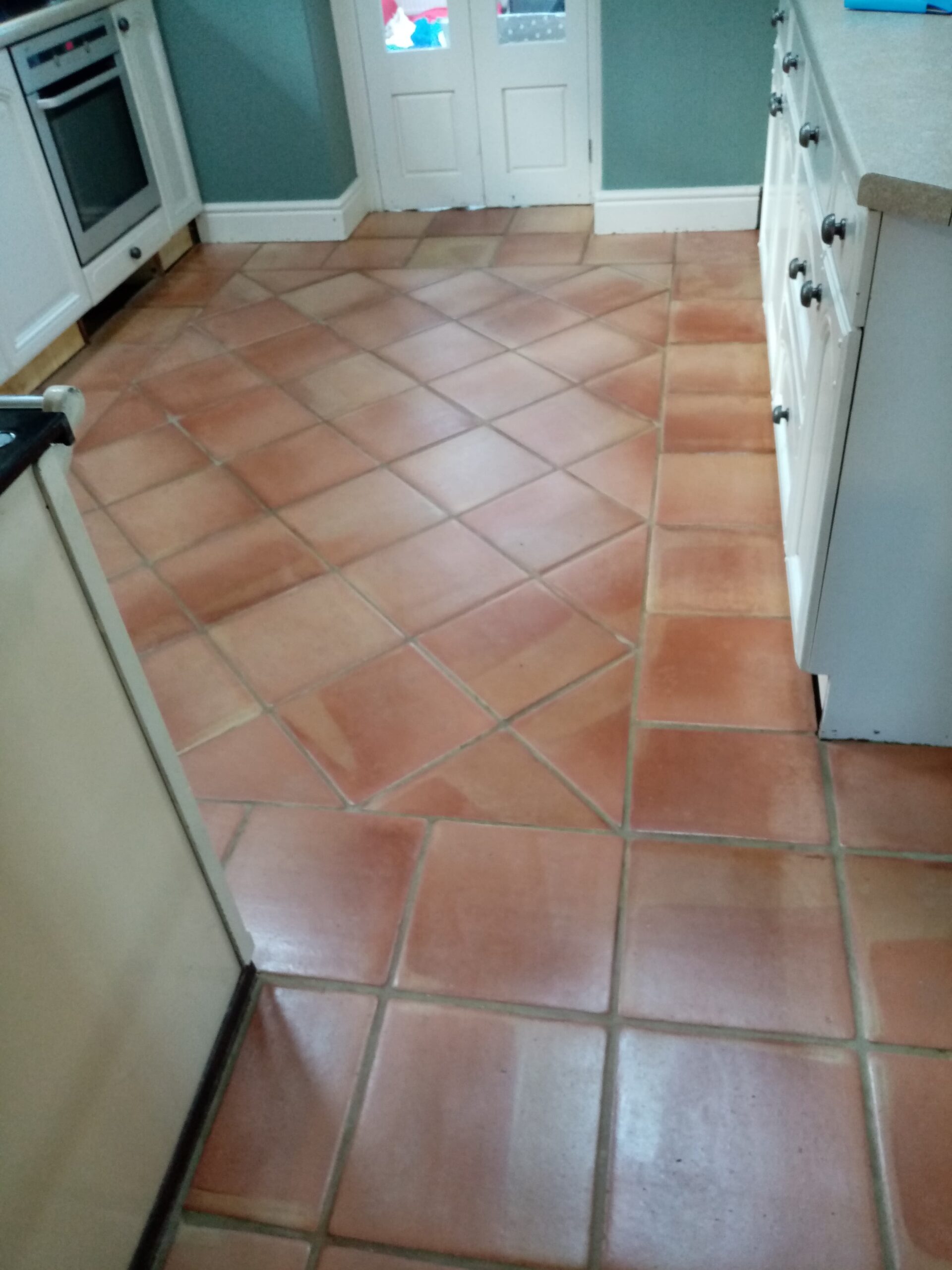Earlier this year a customer from Gloucester got in touch with Tile Doctor through Home Services following a flood that had affected his Terracotta Kitchen floor. It’s difficult to tell from the pictures but the Terracotta floor was badly stained and marked following the flood, it now looked flat and dull and my customer wanted its appearance restored to the way it looked before.

I visited site to survey the tiles a recommend a was way to improve the appearance of the floor. Although now completely dry the floor was not looking its best, but there was nothing we couldn’t remedy. To resolve, I recommended deep cleaning the floor, stripping off any dirt and what was left of old sealers and then applying a new sealer. I gave them a formal quote which they could pass on to their insurance company and a not long after we received a call to say they were able to go ahead with the work.
Deep Cleaning a Terracotta Tiled Kitchen Floor
My first job was to prepare the floor for cleaning by removing the kickboards under the kitchen units and sweeping away any grit. Next the floor was deep cleaned using a strong dilution of Tile Doctor Pro-Clean which was left to soak into the Terracotta tiles for ten minutes. This gives time for the Pro-Clean to get to work breaking down the old sealers and dirt trapped in the pores of the tile. The Pro-Clean was then scrubbed into the tile using a black buffing pad fitted to a rotary machine.
After scrubbing the floor soiled cleaning solution was rinsed away with water and extracted from the floor using a wet vacuum. The tiles were then inspected to see if more work was required, there were a few areas I was not happy with, so the process was repeated where needed.
I then turned my attention to the grout lines which were really ingrained with dirt. I cleaned these with Tile Doctor Remove and Go which is a stronger product that is really designed for removing stubborn sealers but is also a powerful cleaning agent in its own right. Again, I left the product to soak into the grout for ten minutes before scrubbing it by hand with a stiff brush to really get the grout clean.
After rinsing and extracting one more time the Terracotta and Grout were as clean as they could be, and I left the floor to dry off fully for four days. Terracotta is very porous, so it absorbs the water and takes longer to dry than other tiles.

Sealing a Terracotta Tiled Kitchen Floor
On my return I first checked the floor for moisture using a damp meter taking several readings around the floor to satisfy myself it was dry. Applying a sealer to a damp tile would lead to an inconsistent result so it’s always best to be sure.
Eight coats of sealer were needed to ensure the floor was fully sealed, again Terracotta is very porous, and it can really drink the sealer. For this floor I chose Tile Doctor Seal and Go which works really well on Terracotta it added a nice subtle shine to the tiles and will ensure the floor is protected going forward. It’s also water based so you don’t get a smell as it dries.

Afterwards the floor looked great and the customer was very happy. They are just hoping there will not be a repeat of the floods that caused the previous damage.
Source: Professional Restoration of a Terracotta Tiled Kitchen in Gloucestershire
Covering Gloucestershire, Malcolm Crowther is your local Stone, Grout and Tile renovation expert and an agent of Tile Doctor, the largest Tile, Stone and Grout restorative Terracotta network in the UK who have developed the products and techniques to handle a multitude of issues surrounding tile, stone and grout, internal and external, domestic or commercial.